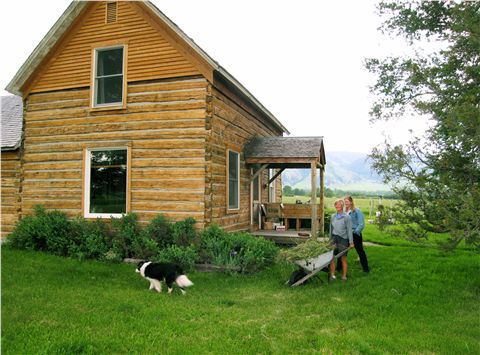Purpose
- Investigates the causes of economic imbalances.
- Investigates the effect of the global financial system and/or the monetary system in fostering a sustainable economy.
- Investigates causes tending to destroy or impair the free-market system.
- Explores and develops market-based solutions.
Summary
Predator Conservation Alliance's Wildlife Friendly Certification Project is exploring and developing market-based solutions that conserve and protect endangered wildlife around the world. The grant from the Walker Foundation supported an international Wildlife Friendly Summit held in Jacksonville, Florida, that brought together business leaders, entrepreneurs and wildlife biologists to investigate markets for wildlife-friendly products, and discuss ways to overcome perverse economic incentives and build fees for ecosystem services into the cost of producing goods. A report from this summit will be generated by the end of March.

Restored log house, Thirteen Mile Lamb & Wool Company, a Predator Friendly ranch in Montana. (Photos by Barrett Walker on Foundation site visit.)
Description
Thanks to the Walker Foundation, this project has investigated the causes of economic imbalances in agricultural practices by partnering with M.B.A. students from the Haas Business School at University of California Berkeley. Their findings and the findings of other business experts helped participants at an international Wildlife Friendly Summit investigate ways to use market-approaches to solve a conservation problem -- the extinction of predator species. Predators represent both a compelling symbol and practical biological handle for demonstrating and deriving benefit from intact ecosystems. Therefore this new project will help wildlife friendly eco-labels coalesce around the nucleus of the Wildlife Friendly concept by coordinating existing international entrepreneurial efforts, and expanding markets for wildlife friendly products.
If successful, such a project will result in protection of wildlife populations on the ground, coupled with improved economic viability of human communities that coexist with such wildlife. By helping businesses demonstrate economic benefits related to such a controversial and emotionally charged endeavor as predator conflict management, this project can help make the broader challenge of internalizing environmental costs in all human economic activity a more tangible, personal and incremental imperative.
2010 Follow up to grant

The Wildlife Friendly certification program was launched in 2010 after two years of research, peer reviews, and discussions with leading Eco-label programs. As of Dec. 2010, ten enterprises were certified.
Purpose
This project meets the goals of the Walker Foundation by exploring and developing market-based solutions for economic imbalances that have caused the decline of wildlife species. Agricultural business activities commonly operate with perverse economic incentives that inadvertently cause damage to the very ecosystem services which enable agriculture and vibrant economic systems to thrive. Economists have identified the failure to account for the benefits of ecosystem services in a monetary system. To address this problem, Predator Conservation Alliance is participating in an eco-labeling venture that aims to harness market forces to support the dual goals of wildlife conservation and sustainable human economies. We seek to build upon our embryonic work in administering our Predator Friendly certification by creating larger economies of scale for Predator Friendly products through collaborating with other conservation groups who are engaged in similar and related facets of trade in ecologically sustainable products. Our vision requires cost-effective, credible, and nimble certification procedures; an education campaign targeted at consumers; and efficient distribution and marketing support for conscientious producers.
Scope
In many areas of the world, including the United States, wildlife cause economic losses for agricultural producers. The economic losses create conflict and, sometimes result in the destruction of wildlife and their habitats across the globe. This is especially true when people do not enjoy, or are unaware of the economic benefits from wildlife conservation. Predator Conservation Alliance has the tools to mitigate such conflicts and we believe there is a way to use markets to meet wildlife conservation goals. Working in business environments is new for many environmental non-profit organizations. Yet we must understand the challenges faced by small specialty businesses, such as import/export regulations, marketing, supply chain operations, and distribution. We must also understand the needs and desires of consumers if we aim to promote and facilitate ecologically sustainable production and consumption. Although environmental organizations face a steep learning curve, several successful models of conservation entrepreneurship exist; some of these leaders have joined our consortium to share the lessons they have learned an guide other similar efforts. These lessons can be applied nationally and internationally by finding markets for Wildlife Friendly goods and reducing perverse incentives.
Information Dissemination
The Wildlife Enterprise Network steering committee plans the following actions for the coming year to follow up on the Walker Foundation funded meeting:
• Develop a mission statement, guiding principles and the house brand;
• Devise and disseminate the systems for Network communication and criteria for membership;
• Share lessons and information across the Network;
• Increase awareness of the Wildlife Enterprise Network among donors, policymakers, managers, regulators and the public via the internet, trade shows, press/media and commercial advertising;
• Provide technical and/or material support to candidate projects, as resources permit;
• Monitor and evaluate the impact of member or candidate projects on wildlife and wild places, and measure economic/equity impacts for producers’ communities; and,
• Raise funds for the above activities.
Project Link www.wildlifeenterprisenetwork.org/origin.htm (Project Report Exec. Summary)
Amount Approved$15,000.00
on 6/13/2006
(Check sent: 7/6/2006)
international Wildlife Friendly Summit held in March 2007 at the White Oak Conference Center near Jacksonville, Florida brought together business leaders, entrepreneurs and wildlife biologists. M.B.A. students from the Haas Business School at University of California Berkeley and other business leaders presented their findings.